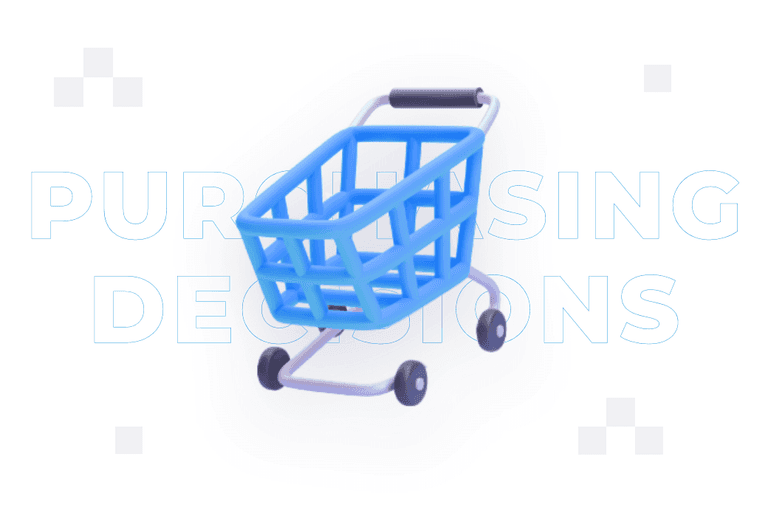Table of contents

Purchasing decisions – what influences them?

The purchase of a product is the end result of a consumer’s purchasing decision process. However, this process is influenced by many factors. Knowing these will, among other things, enable you to tailor your product or service offering to your customer’s preferences and to meet their expectations, thereby increasing the likelihood of a positive purchase decision. In this article you will learn:
- What are purchasing decisions?
- What are the types of purchasing decisions?
- What factors influence purchasing decisions?
- Why is it important to know the factors that influence customer behaviour?
Purchasing decisions – definition
A customer’s purchasing decisions are one of the final stages that make up the purchasing process. As a result, the consumer decides to purchase a particular product or use a particular service. Depending on the customer group in question, we can distinguish between different types of purchasing decisions.
Types of purchasing decisions
We can divide consumers’ purchasing decisions into:
- impulsive – impulsive decisions are spontaneous decisions made under the influence of a specific impulse; they usually result from an emotional admiration for a product or the need to satisfy a given need immediately – e.g. hunger,
- habitual – habitual decisions are purchasing decisions that consumers make as a result of being accustomed to a particular product or service; habitual purchasing decisions are usually associated with satisfaction and attachment to a particular brand and a lack of need to search for alternative products or services,
- extensive – in this case, the consumer needs more thought and more time to make a purchase decision; extensive purchase decisions are prudent decisions, and usually involve high-value products such as cars or real estate,
- limited – limited purchase decisions are an intermediate form between habitual and extensive purchase decisions; they concern purchases that are more important than routine purchases but less important than extensive purchases – the decision-making itself also takes less time than in the case of extensive decisions; limited purchase decisions concern, among others, products such as consumer electronics, small household appliances or more expensive cosmetics.
Factors influencing consumer behaviour
The purchasing decision-making process depends on a number of factors. These include:
Personal factors
In the context of purchasing decisions, personal factors, among others, play an important role. These include aspects such as gender, age, interests, character or the consumer’s attitude to risk. Personal factors will influence both the type of products or services chosen and the length of the purchasing decision process. For example, women will be more likely to go for make-up products than men. Those who prefer safe, tried-and-tested solutions will take longer to make a purchase decision on a risky investment, and inherently hesitant customers will be more easily persuaded to buy products suggested to them by a salesperson.
Psychological factors
Psychological factors influencing the purchase decision process can be divided into cognitive and activation factors. Cognitive psychological factors include perceptions and the learning process. Perceptions refer to how consumers perceive a product or service. Perceptions can result both from previous experiences with the product or service and from advertising campaigns carried out, for example on social media. On the other hand, information and associations, relating to similar products or services, are associated with the learning process – again, these may come from the consumer’s own experiences and other sources of information, such as TV and radio advertisements, or marketing activities, carried out on social media.
Activating psychological factors, on the other hand, include emotions, motives, attitudes and needs. The decision-making process to purchase a product or access a specific service is strongly influenced primarily by emotions. For this reason, advertising messages are often constructed in such a way as to evoke emotions in consumers that will induce them to make a positive purchase decision. Customers’ behaviour is also influenced by their intrinsic motives, such as hunger or self-fulfilment. Needs are not insignificant. Raising awareness of a need and indicating the importance of a product that can satisfy it is another (besides arousing emotions) popular advertising ploy.
Economic factors
Economic factors will also influence the purchase of a particular product or service. These include, among others, the consumer’s income level, his or her savings, the current level of inflation or the prices of selected products and services, the availability of credit and interest rates (the last two factors usually apply when the customer wants to purchase more expensive products or services, such as cars or real estate).
Technological factors
Technological factors relate to the ongoing development of new technologies that are constantly changing the market and influencing consumer behaviour. Technological factors influencing consumer purchasing decisions include:
- accessibility of information – consumers value situations in which they have access to all the information, concerning a given product or service – e.g. its specifics, opinions about it, price, delivery methods, payment methods or return policy – ensure that the information, included in the offer, is clear, understandable and complete,
- various methods of purchase – nowadays most customers prefer to buy online, but this does not mean that stationary shops should be withdrawn – give your consumers a choice – then you will be sure to meet their expectations,
- access to electronic payments – the various methods of purchase are also linked to the various payment methods (including electronic payments) that you should offer your consumers,
- personalisation of offers and advertisements – by knowing your target group – their preferences and needs, you can personalise your offers and advertisements; thanks to personalisation, your marketing activities will be much more effective,
- presence of the brand in social media – social media can be used both to verify the opinions of other customers about your products or services, as well as for direct communication with the brand – so make sure to be present in social media,
- process automation – this includes, above all, automatic management of available resources, automatic acceptance of orders and communication with customers using chattbots – solutions using artificial intelligence and machine learning speed up the process of customer service and increase its effectiveness, thus influencing greater satisfaction of consumers,
- privacy and data security – when running an online shop, remember to ensure the privacy of your consumers and the security of their data – failures in this area could effectively deter customers from buying from your shop again.
Social factors
When talking about the social factors that influence purchasing decisions, point to family members, social groups to which consumers belong and opinion leaders, among others. Family members are the people who usually shape our purchasing decisions – it is on them that we model our subsequent behaviour. Purchasing decisions are also often influenced by the social groups to which we belong or would like to belong. The feeling of belonging to a group or the desire to belong to a group is a strong factor that determines our purchasing decisions – it is often members of a social group that determine which products or services we reach for. Opinion leaders are also important. These are well-known individuals, such as influencers, who are able to shape public opinion on a given topic. “The ability” is usually due to their recognisability and extensive knowledge of the topic.
Cultural factors
By growing up in a certain culture, consumers adopt certain values, attitudes and associated behaviours, which then influence their purchasing decisions. Also linked to cultural factors are the social classes to which individual customers belong. Depending on the specific social class and its characteristics, the consumer will want to purchase a certain type of product, e.g. luxury items, or, conversely, will not be interested in them (even despite their means).
Awareness of factors that influence consumer purchasing decisions – benefits
Knowing and understanding the factors that influence consumer purchasing behaviour and decisions will bring many benefits to your business. This is because it will allow you, among other things, to
- tailoring your offer to consumer needs – by knowing what exactly influences your consumers’ decisions and behaviour, you can create product and service offers that will fully meet their needs and preferences, and thus – effectively convince them to make positive purchasing decisions,
- increase the competitiveness of your offer – an offer that is fully tailored to customers’ expectations will stand out in the market and attract further consumers interested in using it,
- increasing customer satisfaction – consumers like situations in which the offer is tailored to their individual needs and preferences – this increases their satisfaction and subsequent satisfaction with the product or service purchased,
- winning loyal customers – satisfied customers will be eager to return to you and recommend your brand further, thus becoming your brand ambassadors,
- running effective marketing campaigns – knowledge of the factors determining consumer behaviour and purchasing decisions will enable you to create well-thought-out and thus effective marketing campaigns,
- reducing costs – focusing on specific actions, depending on factors influencing consumer purchasing decisions, will allow you to reduce marketing costs and increase ROI,
- achieve business goals – by knowing what influences consumer decisions and behaviour, you can better plan your business goals and then – effectively and consistently achieve them.
Contact form
Develop your brand
Rate content:
You may be interested in:




